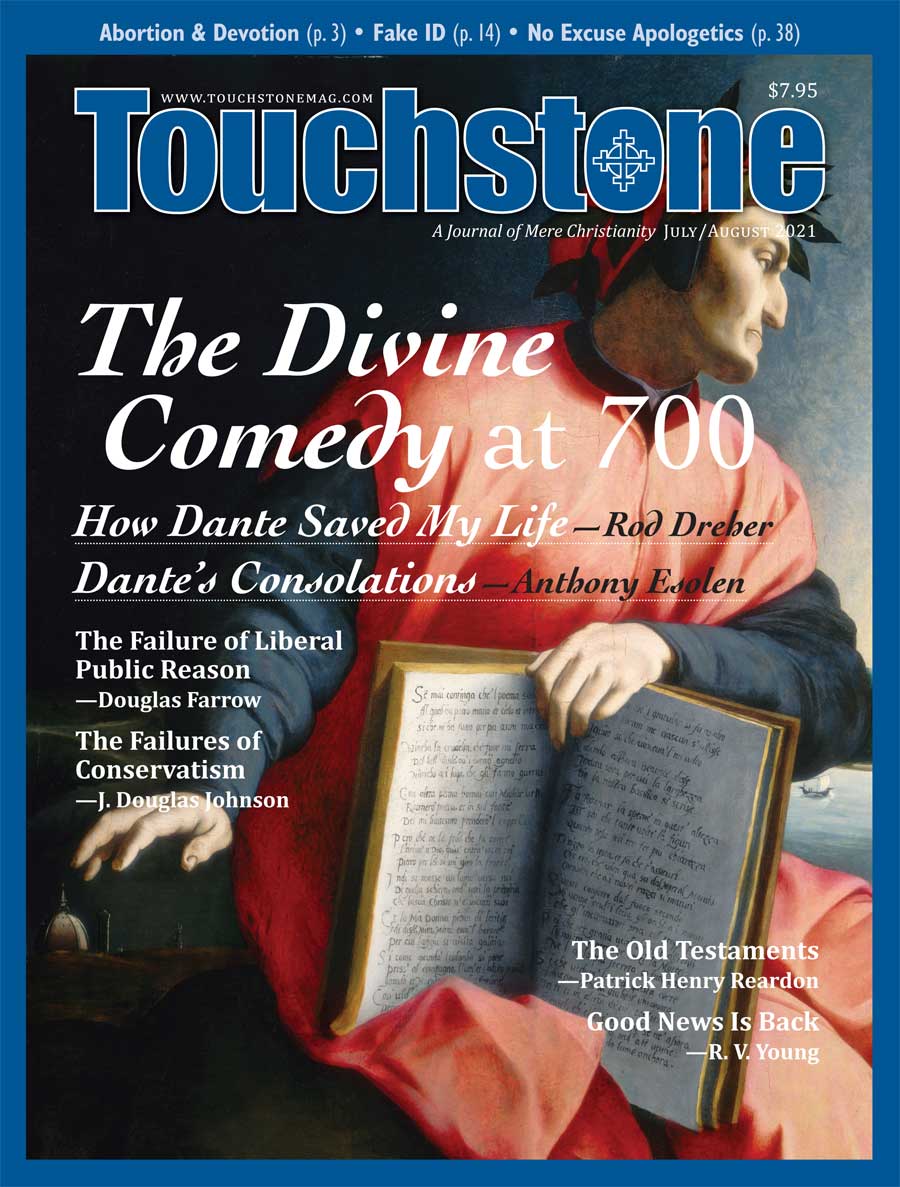The Complete Apologist
Four Essentials Every Christian Is Called to Embrace
by Donald T. Williams
American conservative Christians are not as biblical as we think we are. While we are clearly commanded always to be ready to make a defense to anyone who asks a reason for the hope that is within us (1 Pet. 3:15), vast swaths of us think it is somehow unspiritual to obey this biblical commandment. While we now have an Apologetics Industrial Complex with enough interested consumers to keep it in business, it has virtually no influence on the rank and file in the pews, the conduct of life in the church, or the practice of evangelism outside the closed circle of apologetics nerds. Therefore, we need some theses on this critical and essential but much misunderstood branch of Christian theology and ministry.
I. Full Readiness
First Peter 3:15 is frequently cited as a prooftext for apologetics—rightly so. Often the context is not noted, but it adds a crucial level of understanding to what is being asked of us. The commandment is part of an ongoing discussion of persecution from chapter 2 that resumes in 3:8. In such times, Christians are to return good for evil and blessing for curses (3:9). They are to be zealous for good, make sure that if they suffer it is for righteousness, and not be intimidated or troubled (3:13–14). Instead, they are to "sanctify Christ as Lord in your hearts, always being ready to make a defense to anyone who asks you to give an account for the hope that is in you, yet with gentleness and reverence" (3:15). Then the discussion continues, circling back to the topic of persecution. The result of this defense is that those who slander Christians will be put to shame by the Christians' good behavior (3:16).
The context does not lessen the emphasis on rational apologetics but roots it in the realities of life. That is why the actual imperative verb, the command, is to "sanctify Christ as Lord in your hearts." We are to set Christ apart as absolute monarch of our central, inner personality. He is to be Lord of that central core, the unity from which flow the distinct faculties of intellect, will, and emotion. (In biblical usage, the heart is not a symbol for the feelings, as in modern English, but rather for that central core of the whole personality.) Then, when people see how we respond to persecution, returning blessing for curses, they will be astonished and want to know why we do such a thing. When they do, we must be prepared with a reasoned response, a defense delivered not as a counterattack but rather "with gentleness and reverence." That's what apologetics is supposed to look like.
This "account" (NASB), or in some translations "defense," is the Greek word apologia, source of the English apologetics. It was a legal term for the final summation a lawyer would make in defending his client to a jury. He would present the evidence for his client's innocence, with sound reasoning about that evidence, to lead the jury to the correct verdict: acquittal. There is, then, evidence that our hope is not misplaced, and there are rational reasons why Christians hold to it that we need to know and be prepared to present. This readiness is commanded. It is an integral part of making Christ Lord of our hearts. It is therefore for every believer, not just for nerds and
intellectuals.
No dichotomy is permitted. The commandment includes both message and manner, substance and style. It is a rational defense requiring preparation (message, substance), and it is to be delivered with gentleness and reverence (manner, style). We are not obeying if we have mastered every argument only to run through poseurs on skeptical websites with our intellectual rapiers. Nor are we obedient if our courage and hope in the face of suffering or even persecution make our neighbors scratch their heads, but then we have nothing to tell them but "just believe." Demanded is the same kind of wholeness that Paul called "speaking the truth in love" (Eph. 4:15): not either/or, but both/and. Many of us who think we are practicing apologetics are simply in disobedience
here.
II. Essential to Discipleship
If a disciple is a baptized person learning to obey all of Jesus' commands (Matt. 28:19), and if Jesus gave us this one through his Apostle, then a disciple must be a person who aspires to be always ready to make a defense, and the kind of person whose response to suffering and persecution invites the questions it is designed to answer. Apologetics is therefore an essential part of Christian discipleship. The existence of the commandment is sufficient to make this point, but there is more to be said about why it is important. Christian apologetics is based on a biblical precept, a biblical precedent, and a biblical principle.
The biblical precept is the command of 1 Peter 3:15. It is not an isolated injunction but a special application of the Great Commission (Matt. 28:18–20). It is also an application of the mandated teaching ministry of the Church, which has the goal of "equipping the saints for the work of service" (Eph. 4:12) by grounding them in the Word that is profitable for teaching "so that the man of God may be adequate, equipped for every good work" (2 Tim. 3:17). In that teaching, "We proclaim him, admonishing and teaching every man with all wisdom so that we may present every man complete in Christ" (Col. 1:28). This surely includes the preparation called for by Peter's command. Apologetics is then relevant not only to evangelistic preaching but also to the proclamation that edifies and equips the saints for ministry, including evangelism. Thus we respond also to Jude's appeal that we "contend earnestly for the faith once delivered to the saints"
(Jude 1:3).
The biblical precedent is the example set by the Apostles of integrating apologetics seamlessly into their proclamation. Luke sets the stage by noting that Jesus had presented himself to the disciples by "many convincing proofs" (Acts 1:3). Then the early Christians preached as if they had that kind of foundation. Verbs like "reasoned," "argued," and "persuaded" or conjunctive adjectives like "therefore" appear frequently in the narrative of Acts. Peter's Pentecost sermon sets the precedent: it appeals to the disciples' experience and to the Old Testament, concluding with a rousing "Therefore let all the house of Israel know for certain that God has made him both Lord and Christ—this Jesus whom you crucified" (Acts 2:36, emphasis added). They could accept Jesus' Messiahship with confidence because of the logical connections of the conclusion to the evidence that had been so clearly and powerfully presented.
Paul is the Apostle of grace par excellence, and the Apostle of apologetics par excellence, too. He began his public ministry by "proving" to the Jews in Damascus that Jesus was the Christ (9:22). He did this by "arguing" (9:29). In Thessalonica he "reasoned" and "gave evidence" (17:2–3). Luke calls the Bereans "noble" because they thought through Paul's claims for themselves, "examining the Scriptures daily to see whether these things be so" (17:11). Paul is next found "reasoning" with the Greeks in Athens (17:17). At the end of his Areopagus sermon, he claims that the historical Resurrection is "proof" that God was revealed in Christ (17:31). The philosophers were a tough audience, but some, including Dionysius and Damaris, were saved.
Some criticize Paul for his apologetic approach in Athens, blaming it for his limited success there and claiming that he then returned to preaching the "simple Gospel." Most of us would give our right arm for the assurance that we would have a few converts from our most skeptical audiences! But the real response to that view is simply to point out Paul's consistency. He did not start reasoning and persuading in Athens; he had been doing it all along, and he kept right on doing it after he left. We next find him in Corinth, "reasoning in the synagogue every Sabbath and trying to persuade Jews and Greeks" (18:4).
It's not just Paul. After his instruction by Priscilla and Aquila, Apollos is described as a big help because he "powerfully refuted the Jews in public, demonstrating by the Scriptures that Jesus was the Christ" (18:28, emphasis added). Then, in Ephesus, we switch back to Paul, "reasoning and persuading" (19:8). In Jerusalem, he gives an apologia before the Jews who had rioted in the Temple (22:1)—the same word used in 1 Peter 3:15. He uses the verb form of that word to describe his defense to Felix (24:10). And he spends his time under house arrest in Rome "trying to persuade" the Jews about Jesus (28:23). Some were persuaded (28:24).
There is a consistent pattern here. Paul appeals to premises he can expect his audience to accept as evidence and tries to persuade them that this evidence supports the claims of Jesus to be Lord and Christ. With Jews he appeals to the Old Testament, because they already accept it as the Word of God. With Greeks he might appeal to general revelation, the witness of Nature to her Creator. With everyone he appeals to the historical Resurrection, which "was not done in a corner" (Acts 26:26). There were five hundred eyewitnesses to it, most of whom are still alive (1 Cor. 15:6). Finally, he adds his own eyewitness testimony from the Damascus Road (15:8). The biblical precedent is clear: Peter was not asking us to do anything the Apostles had not already practiced, setting us an example of faithful witness.
The biblical principle is that God wants to save whole persons, minds as well as emotions, intellects as well as wills. Jesus went out of his way to establish this principle in his explanation of the Greatest Commandment: to "love the Lord your God with all your heart, and with all your soul, and with all your mind" (Matt. 22:37). The Gospel calls people to love God that way in the light of his glorious grace shown in Christ. Therefore, the Gospel addresses the whole person, including the mind. It does not speak only to intellectuals, or in a way that only intellectuals will understand. But we must present the Gospel as if it were actually true, something that can be thought about as well as felt, that can stand up to the rough and tumble of rational investigation, and that will affect the whole life of those who believe.
Not every believer is called to major in apologetic ministry, but everyone is called to treat the Gospel as actually true. So we are given a command to do so, good examples of people following that command, and a principle that explains why it is important.
III. Winning People, Not Arguments
Apologetics is a necessary aspect of discipleship; it is also a dangerous one. I say this as one who is fully aware that I am susceptible to its pitfalls. Apologetics is especially dangerous to those who are prone to pursue it. We have egos. We like winning arguments. In fact, we relish demolishing our opponents, standing over their defeated carcasses, and receiving the ovations of those who already agree with us as we do so. But that does not sound much like the apologetic Peter's command calls for.
The goal of apologetics is not to win arguments, but people. It is to win people to Christ, to remove obstacles to their belief in him, and to help their faith in him have integrity and flow from their whole personality, not be just an emotional response. We remove obstacles to belief because they are obstacles to seeing Christ as he is and loving him. We want faith to be more than an emotional response because love is more than an emotional response, and we want people to love him deeply, with all their souls, all their might, and all their minds. They will find it hard to love Jesus that way unless they see something in us as his representatives that does not repel them. The experience of being defeated and then subjected to a victory dance is not conducive to conversion.
Still, we cannot make the case for Christ without winning arguments. We have to show that our view is based on a better sampling of real evidence, that it is a logical conclusion reached by valid argument from that evidence, and that the other view is not. Our potential disciple has picked up ideas that come straight from the Enemy. It is easy to forget that this potential disciple is not the Enemy, but rather one of his victims. If he is attacking you as a superstitious misleader of the masses and an idiot, that mistake is especially easy to make. But it is never helpful.
So we have to win arguments in such a way that we also win people. It is the old difficulty of speaking the truth in love. I can speak the truth; I can be loving to people I disagree with. Doing both at the same time? That takes dependence on the Holy Spirit. And that takes a death to self that does not come naturally at all.
Addiction to winning arguments at all costs is an insidious malady, like food addiction. If you are addicted to alcohol, drugs, or gambling and are finally serious about getting your life back, you can go cold turkey and give those things up completely. It is (relatively) clean and uncomplicated: you walk away and never look back. But addiction to food is more difficult. You cannot just walk away from food, or you won't be alive much longer. You have to look back all the time. That is the position we are in with winning arguments instead of people. If we give up arguments altogether, we are no longer doing rational apologetics. We have no choice but to do the dying to self which alone can allow the Holy Spirit to use us.
Since we must use arguments, they had better be good ones. Presenting them in love does not absolve us from the responsibility to make them evidentially rich and logically rigorous. "'Logic!' said the Professor half to himself. 'Why don't they teach logic at these schools?'" (C. S. Lewis, The Lion, the Witch, and the Wardrobe). Well, they ought to. And if the public schools won't, maybe Sunday schools should.
We serve the God of truth, whose Son is the Way, the Truth, and the Life (John 14:6). We cannot serve him with lies. We serve a God whose character is the ground of logic. It is because he cannot lie (Titus 1:2) that the law of non-contradiction is universally valid. We cannot serve him with fallacies. To do so is to blaspheme his name, because it implies that he is not true. Any such apologetic undercuts itself at every turn. In every endeavor, we should give him our best, not because it is adequate but because he deserves nothing less.
This is especially true in apologetics. The truth of his existence, the trueness of his character, and hence the truth of his Word, are at issue. It is important that we speak the truth in love, compromising neither. Because they both proceed from his character, you cannot have one without the other.
IV. Dependence on the Holy Spirit
Those who object to apologetics often say, "You cannot argue people into the kingdom." They sometimes add that nobody has ever been saved by apologetic argument. Well, the second claim is demonstrably false. C. S. Lewis attributed his conversion to Tolkien's argument that, when Lewis rejected Christ as a myth parallel to the dying god myth of pagan religions, he was being inconsistent. What if the "dying god" had actually happened once? Charles Colson famously attributed his conversion to the arguments in Mere Christianity, and countless others give them a role in either their coming to faith or their persevering in faith. It is true that argument alone never converted anybody, but that is a very different claim, one that no apologist need fear.
The first claim—that you cannot argue people into the kingdom—is true. It is also irrelevant. You cannot preach or witness people into the kingdom either, but nobody advocates the abolition of sermons or the Great Commission. Only the Holy Spirit can bring a person through real conviction of sin to saving faith in Christ, and he has ordained certain means through which he normally works in doing so. If we let the New Testament tell us what they are, we will include the written Word, the preached Word, personal testimony, prayer—and apologetic argument. The critics cannot remove apologetics from the list because they do not have the authority to cut the commandment in 1 Peter 3:15 out of the Bible.
No sinner puts his faith in Christ for salvation without a supernatural intervention by God. Paul is clear about this. "A natural man does not accept the things of the Spirit of God" (1 Cor. 2:14). It is not natural for him to do so because the Gospel undercuts his commitment to his own autonomy. The Gospel will not let him be his own lord or allow him to take any credit for his own salvation. Apart from the intervention of the Spirit in conviction and calling, he will remain in his trespasses and sins and, thus, spiritually dead (Eph. 2:1).
No preacher, witness, or apologist can bring the spiritually dead to life. No wise preacher, witness, or apologist thinks he can. We preach, witness, and present evidence, not because we think any of that can be effective apart from the work of the Spirit, but because God has commanded us to use these means and has promised to work through them. If we are faithful, sooner or later he will enable some helpless sinner to respond positively to the Gospel by giving him new life.
Apologetics is no exception to this rule. The most brilliant apologist in the world is just as totally dependent on the work of the Spirit to make his efforts fruitful as the most powerful preacher and the most sincere witness—no more so, and no less. We will be better preachers, witnesses, and apologists when we realize this truth.
We trust that God in his goodness and love did not command us to speak and persuade unless he planned to bless our obedience. We trust also in his wisdom. And so we obey, and so we can obey in hope. And so—and only so—God will work.
Donald T. Williams is Professor Emeritus of Toccoa Falls College. He stays permanently camped out on the borders between serious scholarship and pastoral ministry, between theology and literature, and between Narnia and Middle-Earth. He is the author of fourteen books, including Answers from Aslan: The Enduring Apologetics of C. S. Lewis (DeWard, 2023). He is a contributing editor of Touchstone.
Share this article with non-subscribers:
https://www.touchstonemag.com/archives/article.php?id=34-04-038-f&readcode=10574
subscription options
Order
Print/Online Subscription

Get six issues (one year) of Touchstone PLUS full online access including pdf downloads for only $39.95. That's only $3.34 per month!
Order
Online Only
Subscription

Get a one-year full-access subscription to the Touchstone online archives for only $19.95. That's only $1.66 per month!
bulk subscriptions
Order Touchstone subscriptions in bulk and save $10 per sub! Each subscription includes 6 issues of Touchstone plus full online access to touchstonemag.com—including archives, videos, and pdf downloads of recent issues for only $29.95 each! Great for churches or study groups.
Transactions will be processed on a secure server.
more on apologetics from the online archives
more from the online archives
calling all readers
Please Donate
"There are magazines worth reading but few worth saving . . . Touchstone is just such a magazine."
—Alice von Hildebrand
"Here we do not concede one square millimeter of territory to falsehood, folly, contemporary sentimentality, or fashion. We speak the truth, and let God be our judge. . . . Touchstone is the one committedly Christian conservative journal."
—Anthony Esolen, Touchstone senior editor














